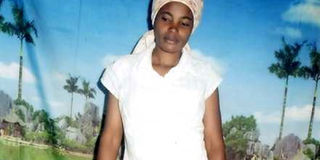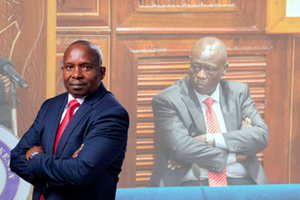How birth-related disorder separates Hannah Wanjiru and husband

Hannah Wanjiru in 2011, a year before she became paralysed. PHOTO | MWANGI MUIRURI | NATION MEDIA GROUP
What you need to know:
- Wanjiru dutifully observed her prenatal clinic visits and all was well until she went into labour on April 28, 2012.
- After the birth, Wanjiru drifted into a coma, and with it the start of the collapse of her marriage.
- When the hospital realised that the situation was getting out of control, it released her, giving Wanjiru’s husband a referral letter to KNH.
On May 12, 2012, a rusty Toyota saloon groaned its way into Ruth Njeri’s compound carrying a passenger she would have been overjoyed to see had the circumstances been different.
The last time a motor vehicle had been to the 80-year-old widow’s compound was in 2006 when a neighbour’s pick up had come to collect the body of her husband, who had passed on in his sleep.
Alerted by the unlikely sound, and at 8pm for that matter, curious neighbours gathered in the compound to witness what the unexpected car had come bearing. To their horror, it had brought a very sick Hannah Wanjiru, Njeri’s daughter.
MARRIED
Two years earlier, Wanjiru had travelled to Nairobi in search of a job. Three months later, reports had come back home that she had got married to a man called Anthony Ng’ethe Munyua.
“I only heard that she was married and living somewhere in Kinoo (an estate in the outskirts of Nairobi). I prayed to God to bless her new home,” says Ms Njeri.
But fate had its own version about the turn that this young woman’s life would take. A visibly weak Wanjiru who is half-paralysed and can barely talk, managed, with the help of her mother, to tell her story.
LOST HAPPINESS
“My husband was elated when I announced that I was pregnant. His love for me increased three times over - I had never experienced such love from anybody. Though struggling financially, my husband did his best to provide for me,” she says.
Wanjiru dutifully observed her prenatal clinic visits and all was well until she went into labour on April 28, 2012. Her husband rushed her to PCEA Kikuyu Hospital where she was admitted.

Hannah Wanjiru, 35 (left) with her mother, Ruth Njeri. Ms Wanjiru has been paralysed for the past seven years. PHOTO | MWANGI MUIRURI | NATION MEDIA GROUP
“Doctors told us that the pains had come sooner than expected, but nevertheless admitted me. I gave birth to a baby girl two days later through caesarean section,” Wanjiru recounts.
The birth of their child should have been yet another happy chapter in the young couple’s marriage, but it was not. After the birth, Wanjiru drifted into a coma, and with it the start of the collapse of her marriage.
Her medical bill rose rapidly by the day, with the first bill coming to Sh44, 336 for the one week she remained unconscious. To make matters worse, their baby girl developed neonatal jaundice, (discolouration of the eyes and skin) on day two, and a fever on day three, raising the bill even further.
“The mother developed a condition known as eclampsia and fits and was referred to Kenyatta National Hospital,” reads part of a medical report signed by a Dr Mburu.
SH64,794 BILL
By the time mother and child were transferred to Kenyatta National Hospital, the baby’s bill had shot to Sh20, 458, hence handing Wanjiru’s husband, a manual labourer who worked in construction sites, a bill of Sh64, 794, of which he could only afford to pay Sh1, 700.
When the hospital realised that the situation was getting out of control, it released her, giving Wanjiru’s husband a referral letter to KNH.
At the KNH, the bill piled to a further Sh42, 000 in three weeks. Wanjiru says that it is then that her husband asked to be allowed to transfer her to a cheaper facility.

One of the Hannah Wanjiru's many medical reports. PHOTO | COURTESY
That cheaper facility turned out to be her mother’s home, where she was driven in the Toyota Sunny that day in 2012.
“The husband reasoned that my daughter was better off in the village rather than in Nairobi. He argued that he was an orphan who had no relatives to help take care of her and promised to be sending money. He however went with the baby, who he named Blessed Kangai,” says Njeri.
MEDICAL BILLS
That was the last time the man was seen in this compound or heard from. Njeri says that the phone number he gave her does not go through, neither does she know where he comes from.
That was seven years ago. Wanjiru’s condition is yet to improve and she is in dire need of aid to cater for her medical bills.
A poor woman, her mother, who lives in Gikarangu village, Murang’a County, relies on casual jobs to make ends meet.

A pregnant Hannah Wanjiru in 2002. PHOTO | COURTESY
“I cannot afford it but I can’t watch my daughter go without treatment - every week I need Sh3,000 for medication, yet my only constant income is the stipend of Sh2, 000 that the government gives me every month. If it were not for the help that my neighbours give us, I don’t know how we’d survive. I call upon all well-wishers to come to my rescue,” she says.
CONVULSIONS
According to Wanjiru’s medical reports, the condition she suffers from strikes with one or more convulsions in a pregnant woman suffering from high blood pressure, and is often followed by coma.
The report says that she suffers from chronic encapsulated intracerebral hematoma (CEIH), a rare cerebrovascular disease which grows progressively while forming a capsule and presenting with neurological deficits. The reports further say that the condition is very hard to correctly execute a successful preoperative diagnosis.
This condition is said to affect one in every 2, 000 to 3, 000 women every year and follows preeclampsia.





